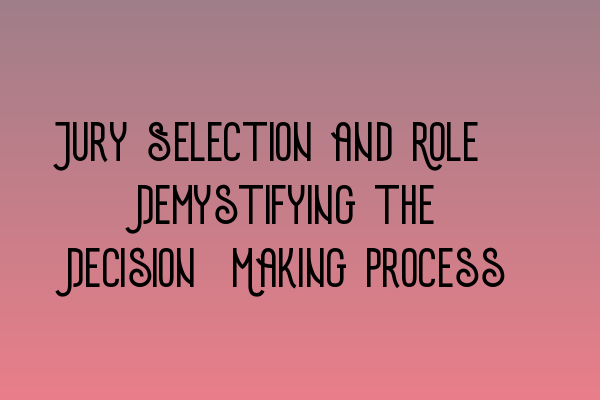Jury Selection and Role: Demystifying the Decision-Making Process
When it comes to criminal trials, one of the key elements of the justice system is the inclusion of a jury. The selection and role of the jury can often be a mystery to many, but it is a crucial part of ensuring a fair trial. In this article, we will demystify the decision-making process behind jury selection and shed light on the role they play in the courtroom.
The Importance of Jury Selection
Before delving into the decision-making process, it’s essential to understand why jury selection matters in the first place. The jury serves as a representation of society and is responsible for impartially determining the guilt or innocence of the accused. A fair and impartial jury is vital to upholding the principles of justice and ensuring a fair trial.
During the trial, the jury listens to the evidence presented by both the prosecution and defense, weighs the credibility of witnesses, and ultimately reaches a verdict. Their decision can have a significant impact on the accused’s future, making the selection process crucial for a fair and unbiased outcome.
Demystifying the Decision-Making Process
The decision-making process behind jury selection begins with summoning potential jurors from the community. These individuals are chosen at random from voter registration lists or other sources to form the jury pool. The selection process aims to ensure a diverse and representative jury that reflects the community’s makeup.
Once the jury pool is formed, both the prosecution and defense have the opportunity to question potential jurors to assess their suitability for the case. This questioning process, known as voir dire, allows the respective parties to uncover any bias, prejudice, or conflicts of interest that may impact a juror’s ability to remain impartial.
The attorneys may ask questions related to the case, personal beliefs, experiences, or knowledge that could influence their judgment. The goal is to select jurors who can weigh the evidence objectively and set aside any personal biases.
To aid in the decision-making process, each juror is typically given a juror questionnaire to provide background information, such as occupation, education, and experiences that may be relevant to the case. This additional information helps the legal team make informed decisions during jury selection.
The Role of the Jury
Once the jury selection is complete, the chosen jurors take an oath to fulfill their responsibilities impartially. The role of the jury is essentially to determine the facts of the case based on the evidence presented and apply the law as provided by the judge.
The jurors listen attentively to witness testimonies, examine physical evidence, and consider any expert opinions presented during the trial. They are tasked with evaluating the credibility and reliability of the evidence, as well as the reliability of the witnesses.
After all the evidence has been presented and the parties have made their closing arguments, the jury deliberates in a private room. It is during this deliberation that the jurors discuss the evidence, weigh the arguments, and ultimately reach a verdict.
Conclusion
Jury selection and the role of the jury are fundamental to the criminal justice system in the UK. The decision-making process behind jury selection aims to ensure a fair and impartial trial, while the role of the jury is to evaluate the evidence and reach a verdict. By demystifying this process, we hope to shed light on the essential role juries play in our legal system.
For more information on legal topics and the legal profession, please check out our related articles:
- SQE Exam Prep: Essential Study Materials for Aspiring Solicitors
- Expert Testimonies in UK Courts: Building Strong Cases
- Demystifying the Solicitors Qualifying Examination Format
- SQE Exam for International Lawyers: Challenges and Success Strategies
- LLC Formation Made Simple: Step-by-Step Guide for UK Entrepreneurs
